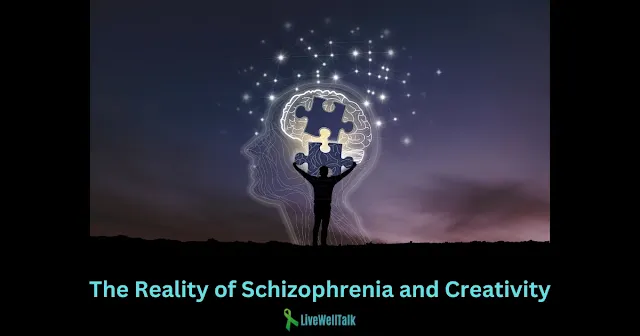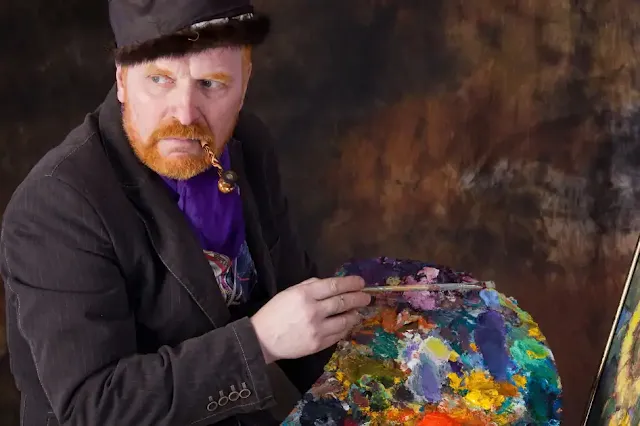The intricate relationship between schizophrenia and creativity has long captured the attention of researchers, artists, and the general public alike. Can creativity flourish amidst the challenges posed by schizophrenia? Can the realms of artistic expression be shaped by the complexities of this mental disorder? In this article, we delve into the depths of schizophrenia and creativity, unraveling the connection, exploring real-life instances, and shedding light on the scientific perspectives that underlie this intricate relationship.
The Relationship Between Schizophrenia and Creativity
There exists some evidence to substantiate this belief. Studies have indicated that individuals with schizophrenia tend to score higher on measures of creativity than those unaffected by the illness. Furthermore, they are more likely to pursue creative professions, such as art, music, and writing.
A study published in the journal Schizophrenia Bulletin in 2013 discovered that people with schizophrenia scored higher on creativity assessments compared to those without the disorder. The study also highlighted that individuals with schizophrenia are more likely to engage in creative professions, such as art, music, and writing.
Another study, featured in the journal Nature in 2011, unveiled that people with schizophrenia exhibit enhanced connectivity between distinct brain regions compared to individuals without the disorder. This augmented connectivity may enable those with schizophrenia to establish connections between ideas that others might not typically consider, potentially fostering more creative thinking.
Nevertheless, we have to acknowledge that not all individuals with schizophrenia possess creative tendencies. In reality, many individuals with the disorder experience substantial cognitive deficits that impede their capacity for creative thinking. Additionally, symptoms like delusions and hallucinations can disrupt creative endeavors.
Several theories attempt to elucidate the relationship between schizophrenia and creativity:
One theory postulates that individuals with schizophrenia possess an alternative cognitive approach compared to those without the illness. They may be more inclined to perceive the world non-linearly, potentially yielding creative insights. Additionally, they might encounter unique perceptual experiences that serve as sources of inspiration for their work.
Another theory proposes that individuals with schizophrenia exhibit heightened cognitive flexibility. This implies a greater propensity to think beyond conventional boundaries and conceive novel and innovative ideas. This cognitive attribute can be an asset for creative work, but it might also precipitate challenges if it contributes to delusions or hallucinations.
It's plausible that medications employed to treat schizophrenia could exert a negative impact on creativity. Certain medications may induce cognitive impairment, hampering creative thought processes. Moreover, some medications might suppress emotions, subsequently constraining creativity.
So, does a link exist between schizophrenia and creativity? The answer is likely affirmative, yet the relationship is intricate. Some individuals with schizophrenia might display heightened creativity compared to the general population, while others might not. The creative potential of individuals with schizophrenia is likely molded by diverse factors, encompassing symptom severity, treatment methods, and individual personality traits.
The Mad Genius Myth
The idea that people with schizophrenia are more likely to be creative than those without the illness has existed for centuries. This belief is often referred to as the "mad genius myth." The myth is based on the observation that many famous artists, musicians, and writers have had schizophrenia or other mental illnesses.
Here are examples of some renowned individuals who had schizophrenia and made significant creative contributions to the world:
Vincent van Gogh - Portrait of dedication
Vincent van Gogh (1853-1890): Van Gogh was a Dutch post-impressionist painter. He is considered one of the most influential artists of all time. He struggled with schizophrenia throughout most of his adult life, and his paintings often mirror his inner turmoil. Nonetheless, his mental illness also fueled his creativity. He possessed a vivid imagination and a unique perspective on the world, evident in his artwork. His most famous works include "The Starry Night" and "Sunflowers."
John Nash (1928-2015): Nash was an American mathematician who was awarded the Nobel Prize in Economics in 1994. He also grappled with paranoid schizophrenia. His first psychotic episode occurred in his early twenties. Nash's schizophrenia profoundly affected his life and work; he faced challenges in concentration and social interaction. However, his creativity helped him overcome his illness and enabled him to continue contributing to mathematics.
Syd Barrett (1946-2006): English musician who was the founding member of the rock band Pink Floyd. Barrett was diagnosed with schizophrenia in the early 1970s, and he left Pink Floyd shortly after. However, he continued to make music and art, and his work has been praised by critics and fans alike. His most famous song is "See Emily Play."
Zelda Fitzgerald (1900-1948): American writer and wife of F. Scott Fitzgerald. Zelda was diagnosed with schizophrenia in the early 1930s, and she spent most of her adult life in and out of psychiatric hospitals. However, she was also a talented writer, and her novel "Save Me the Waltz" is considered a classic of Southern literature.
Eduard Einstein (1910-1965): Son of Albert Einstein, Eduard Einstein was a gifted musician who studied piano and composition at the Berlin Musikhochschule. He was diagnosed with schizophrenia in the early 1930s, and he spent most of his life in and out of mental hospitals.
Gene Tierney (1920-1991): American actress who starred in films such as "Laura" and "Leave Her to Heaven." Tierney was diagnosed with schizophrenia in the early 1950s, and she retired from acting shortly after. However, she continued to write and paint, and she also became an advocate for mental health awareness.
Naomi Wolf (born 1962): An American author, feminist, and political activist, Wolf was diagnosed with schizophrenia in her early twenties. She has extensively written about her experiences with mental illness. Wolf's work is often controversial, but it is consistently thought-provoking. She serves as a powerful advocate for mental health awareness and the rights of those with mental illness.
Niels Bohr (1885-1962): Danish physicist who won the Nobel Prize in Physics in 1922 for his work on quantum mechanics. Bohr developed the Bohr model of the atom, which helped to explain the structure and behavior of atoms. He also made significant contributions to our understanding of nuclear fission and fusion. Bohr was diagnosed with schizophrenia in the 1930s, but he continued to work and contribute to physics until his death.
The mad genius myth is often romanticized, leading one to believe that people with schizophrenia possess heightened creativity. This myth remains just that – a myth. No evidence supports the notion that people with schizophrenia are inherently more creative than those without the illness. In reality, many individuals with schizophrenia grapple with creativity difficulties, as their symptoms may impede their ability to concentrate on creative endeavors.
The mad genius myth can be harmful, perpetuating stereotypes that people with schizophrenia are innately creative or artistic. This stereotype can hinder these individuals from receiving necessary treatment and may subject them to discrimination in both the workplace and society.
The Reality of Schizophrenia and Creativity
The reality of schizophrenia and creativity is much more complex than the mad genius myth. While there may be some people with schizophrenia who are more creative than average, there is no evidence to suggest that all people with schizophrenia are creative, or that creativity is a symptom of the illness.
Many people with schizophrenia struggle with their creativity. The symptoms of the illness, such as delusions, hallucinations, and cognitive impairment, can make it difficult to focus on creative work. Additionally, the stress and stigma associated with schizophrenia can also take a toll on creativity.
Despite the challenges, many people with schizophrenia can find success in creative professions. However, we need to remember that these people are not more creative than average people without schizophrenia. They are simply people who have found a way to use their creativity to express themselves despite the challenges of their illness.
The Future of Schizophrenia and Creativity
The future of schizophrenia and creativity is uncertain. More research is needed to better comprehend the relationship between the two. However, a few promising developments could enhance the ability of people with schizophrenia to lead more creative lives.
One promising advancement is the growing utilization of art therapy for individuals with schizophrenia. Art therapy is a form of psychotherapy that employs art as a means for people to express themselves and manage the symptoms of their illness. Studies have indicated that art therapy can effectively enhance the creativity and well-being of individuals with schizophrenia.
Another encouraging development involves the creation of new medications that are less likely to yield negative side effects on creativity. Certain older medications employed to manage schizophrenia can induce cognitive impairment and emotional numbing, impeding creative faculties. Emerging medications are being designed to more effectively treat schizophrenia symptoms without inducing these side effects.
Lastly, the increased availability of online resources and support groups for people with schizophrenia is fostering a more nurturing environment for creativity. Those with schizophrenia can now connect with peers who comprehend their experiences, enabling them to share their creative endeavors with a broader audience.
The future relationship between schizophrenia and creativity remains uncertain, yet numerous promising advancements have the potential to empower individuals with schizophrenia to cultivate more creative existences.
While there are numerous benefits to embracing creativity with schizophrenia, several challenges also arise. For instance, individuals with schizophrenia may encounter:
Disorganized thinking: People with schizophrenia frequently struggle with disorganized thinking, impeding their ability to focus and concentrate. This can hinder the generation of fresh ideas and the execution of creative projects.
Delusions: Schizophrenia can bring about delusions, false beliefs not shared by others. While occasionally inspiring creative individuals, delusions can also disrupt daily life and hinder functioning.
Hallucinations: Those with schizophrenia might experience hallucinations, sensory experiences devoid of reality. Although sometimes a wellspring of inspiration, hallucinations can also disrupt life and hinder functionality.
Anxiety and stress: Anxiety and stress are commonplace among those with schizophrenia, hampering productivity and concentration. These emotions also form barriers to creativity.
However, the benefits of pursuing creativity while living with schizophrenia are manifold:
Coping mechanism: Creativity can serve as a means to manage schizophrenia symptoms, providing purpose, significance, and an avenue for expressing emotions healthily.
Facilitates connection: Creativity enables people to connect with others who grasp their experiences, fostering relationships and shared understanding.
Income source: Numerous avenues exist for individuals with schizophrenia to monetize their creative endeavors, be it through selling art, writing books, or composing music.
Guidelines for Cultivating Creativity with Schizophrenia
Despite challenges, fostering creativity with schizophrenia is feasible. Here are several suggestions:
Seek treatment for symptoms: Addressing symptoms optimizes functionality and diminishes their impact on creativity.
Learn more here on → Schizophrenia Treatment
Cultivate a supportive environment: This may entail group therapy, engaging in creative arts programs, or connecting with understanding friends and family.
Set realistic goals: Initiate with modest projects, progressively advancing to larger ones rather than attempting too much too hastily.
Embrace experimentation: Creativity thrives on experimentation. Fearlessly embrace novel concepts and observe their outcomes.
Celebrate accomplishments: Upon completing a creative venture, take time to celebrate. This bolsters motivation and sustains the creative drive.
Conclusion
The relationship between schizophrenia and creativity is intricate and not fully elucidated. Some evidence suggests a connection between the two, with individuals afflicted by schizophrenia potentially exhibiting heightened creativity as a means of coping with their condition.
The "mad genius" myth is a hazardous stereotype that warrants caution. Not all individuals with schizophrenia are inherently creative, nor do all creative people possess schizophrenia. While schizophrenia is a serious mental health condition, it does not universally negate one's capacity for creativity.



Comments
Post a Comment